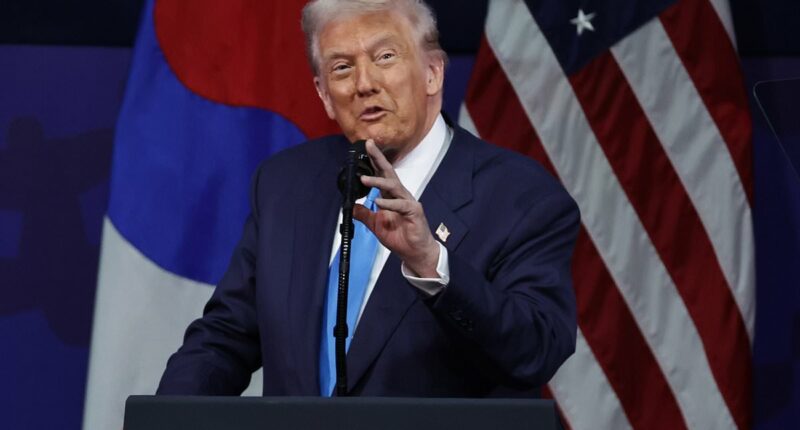Share this @internewscast.com
Donald Trump has claimed another triumph, announcing that he has “won” a battle after Bill Gates acknowledged that climate change won’t spell the end for humanity.
The former president, known for his skepticism toward governmental climate initiatives and his past assertions labeling the issue a hoax, celebrated this perceived victory on Truth Social late Wednesday.
Trump proclaimed, “I (WE!) just won the War on the Climate Change Hoax. Bill Gates has finally admitted that he was completely WRONG on the issue. It took courage to do so, and for that we are all grateful. MAGA!!!”
This declaration follows Gates’ recent remarks minimizing the catastrophic impact of global warming on humanity. He criticized those who perpetuate climate alarmism, suggesting a shift in focus toward pressing health and poverty challenges.
The Microsoft co-founder, whose fortune is estimated at $122 billion, has been a vocal advocate for addressing climate change, previously highlighting its immediate effects on lives and its potential long-term threats to families and future generations.
Nevertheless, Gates now appears to be recalibrating his stance, criticizing the United Nations’ “doomsday outlook” for prioritizing short-term emission goals over efforts to enhance overall quality of life in the present.
The 70-year-old billionaire is calling for more focus and spending on vaccines to fight deadly diseases across the world, including malaria.
‘Although climate change will hurt poor people more than anyone else, for the vast majority of them, it will not be the only or even the biggest threat to their lives and welfare,’ Gates wrote in an open letter ahead of the upcoming UN COP30 climate summit in Brazil.

Donald Trump wrote that he’s won another war after Bill Gates admitted climate change ‘will not lead to humanity’s demise’

Gates downplayed global warming’s effect on humanity and called out those who continually preach climate alarmism, arguing they should instead focus more on health and poverty issues
‘The biggest problems are poverty and disease, just as they always have been.
‘To be clear: Climate change is a very important problem. It needs to be solved, along with other problems like malaria and malnutrition. Every tenth of a degree of heating that we prevent is hugely beneficial because a stable climate makes it easier to improve people’s lives.’
According to his letter, the world has already made significant progress on climate change.
‘People will be able to live and thrive in most places on Earth for the foreseeable future,’ he wrote.
‘Emissions projections have gone down, and with the right policies and investments, innovation will allow us to drive emissions down much further.’
While continued investment in breakthroughs is essential to reach net-zero emissions, Gates warned that health and development funding cannot be sacrificed in the process.
The co-founder argued that the attention should shift from temperature targets to improving human lives, making human welfare the central pillar of climate strategies.
‘Our chief goal should be to prevent suffering, particularly for those in the toughest conditions who live in the world’s poorest countries,’ he wrote.


The president, who has long been a skeptic of government programs attempting to solve the issue and even declared it a hoax, declared victory on Truth Social Wednesday night
Gates acknowledged that some climate advocates might now call him a ‘hypocrite’.
According to the Financial Times, he also later said: ‘If you said to me, ”Hey, what about 0.1 degrees versus malaria eradication?” I’ll let the temperature go up 0.1 degrees to get rid of malaria. People don’t understand the suffering that exists today.’
Michael Oppenheimer, a Princeton University professor of geosciences and international affairs, argued that Gates was framing a misleading narrative ‘usually propagated by climate skeptics.’
‘Despite his efforts to make clear that he takes climate change seriously, his words are bound to be misused by those who would like nothing more than to destroy efforts to deal with climate change,’ he told The New York Times via email.
Johannes Ackva, climate work leader at Founders Pledge, disagreed with Oppenheimer and told the outlet: ‘He [Gates] saw the U.S.A.I.D. situation as more pressing, and something where he could be more effective.’
Monday’s memo comes just a week before global leaders are set to gather in Belém, Brazil, for this year’s COP30.
‘It’s not too late to adopt a different view and adjust our strategies for dealing with climate change,’ Gates wrote.
‘COP30 is an excellent place to begin, especially because the summit’s Brazilian leadership is putting climate adaption and human development high on the agenda,’ he added.

The 70-year-old billionaire is calling for more focus and spending on vaccines to fight deadly diseases across the world, including malaria (pictured: Gates and his daughter, Phoebe, at TIME 100 gala in 2022)
Gates has spent the past 20 years studying climate change, collaborating with scientists and innovators.
Just four years ago, Gates released his book titled How to Avoid a Climate Disaster, outlining technological strategies to combat climate change based on years of research and collaboration.
In 2015, the billionaire launched Breakthrough Energy, a venture that invests in promising clean energy startups and later added a climate policy group in Washington to advocate for emissions reduction strategies.
So far, Gates has backed over 150 clean energy companies, many of which have grown into major industry players.
Then, in March, Breakthrough Energy announced significant cuts, including axing its climate policy group. Two months later, Gates revealed plans to gradually wind down the Gates Foundation.
His foundation has poured billions into the cause, including a $1.4 billion pledge to help farmers in developing countries adapt to the climate.
Nevertheless, Gates continues to invest in clean energy start-ups through groups such as the Breakthrough Energy Catalyst program and the Breakthrough Energy Ventures. He also continues to fund nuclear energy.
According to Gates, ‘temperature is not the best way to measure our progress on climate.’

















